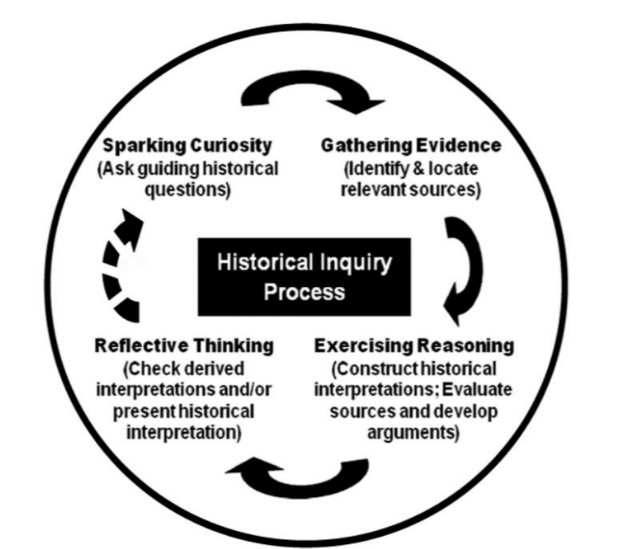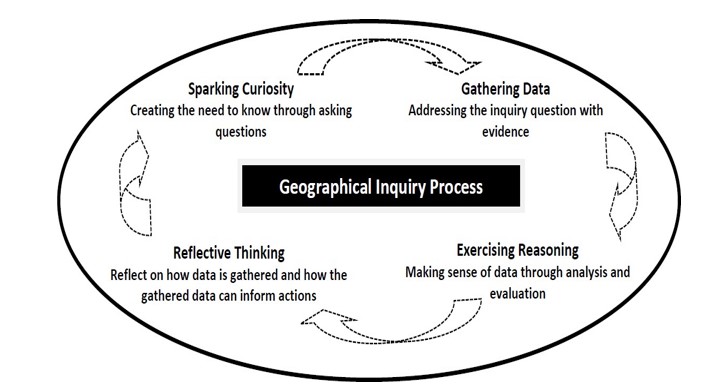Information
Information
Lower Secondary Humanities
History
The Lower Secondary History syllabuses seek to imbue in our students a sense of national identity by helping them understand and appreciate the Singapore they live in today. Students will gain an understanding of Singapore's connection with rest of the world as part of the global trading network prior to the establishment of a British trading post. They will also understand our experiences of being a port city under British rule as well as our experiences under Japanese occupation. Lastly, students will understand Singapore's journey towards independence and how Singaporeans' sense of belonging, reality and hope was fostered in the newly independent nation state.
Historical inquiry is the key pedagogy for the teaching of History. The use of inquiry in the History classroom allows students to reflect on historical questions and issues, and investigate about the past and make reasoned historical interpretations.
Historical inquiry, which reflects the process of “doing history”, entails four phases: sparking curiosity, gathering evidence, exercising reasoning and reflective thinking (see figure below).Through these phases, students are guided through a process to construct, interpret and evaluate knowledge from different perspectives. Students will also monitor, assess and improve their learning.

Key Programmes & Activities
Students will take part in Inquiry-Based Projects where they can conduct historical investigations, while picking up valuable research and collaborative skills.
Geography
The Geography Curriculum Concept articulates teaching with inquiry as a signature pedagogy of Geography educators and hence recommends the Geographical Inquiry Process (GIP) for both classroom instruction and fieldwork. Learning through inquiry stimulates students’ interest in Geography and empowers them to take responsibility for their learning. The inquiry-based pedagogical approach seeks to shift students from a reliance on memorising information to actively construct new knowledge and understanding through comprehension, extraction and application of information from varied sources. The use of geographical inquiry is thus at the heart of Geography instruction and learning, and students will be provided with the opportunities to learn the skills required through practice and engagement in geographical inquiry.

Key Programmes & Activities
-
Local & Overseas Fieldwork
-
ICT Enhanced Lessons
-
Collaborative & Self Directed Learning
Social Studies (NT) / G1 Humanities
The Social Studies curriculum at the NT level/ G1 level seek to prepare students to be effective citizens by helping them understand the interconnectedness of Singapore and the world they live in, and to appreciate the complexities of the human experience through inquiry into real world issues. Some of the topics covered in Lower Secondary Social Studies include how Singaporeans can live in a multi-cultural society, embrace migration, resolve conflict and protect the environment. At the Upper Secondary level, the NT students continue the Social Studies curriculum by exploring issues such as globalisation, management of financial resources as well as building a caring nation and inclusive society.
Additionally, for Secondary 1-2 G1 Humanities, students are exposed to three Humanities Exposure Modules (HEMs) in Geography, History and Literature in English. Some of the topics covered in HEMs include relationship with the national environment (Geography) and the diverse learning experiences in colonial Singapore (History). The HEMs provide students with an all rounded experience in the humanities that will allow them to understand people's relationship with self, society and the environment.
Pedagogies & Modes of Teaching
Inquiry-Based Learning infused in Project Work
Problem-Based Learning
Upper Secondary Humanities
Combined Humanities
Combined Humanities is a compulsory subject to be taken by all Express and Normal Academic students in our school. It is made up of two components. All students will take Social Studies. In addition, students will choose to take an elective. In our school, Geography and History electives are offered.
Social Studies will allow students the opportunity to explore issues concerning societies in this interdependent world. The subject will help students develop a global perspective and be a responsible member in local and world community.
Geography Elective students can expect to acquire a wide range of knowledge and skills to understand and explain physical and human phenomena, contemporary environmental and social issues that occur in different places and cultures. They can expect to acquire insights into future challenges through the study of contemporary geographical issues of national, regional and global importance.
History Elective is a subject where students actively engage in historical inquiry to develop themselves into confident, self-directed, critical and reflective thinkers. Students will learn about concepts centred around events after World War I, World War II and the Cold War. Students will develop the ability to organise and communicate their historical knowledge and understanding through a variety of ways. They will develop the ability to ask relevant questions about the past and examine a range of sources critically in their historical context to reach substantiated judgments about the past.
Pedagogies & Modes of Teaching
Inquiry-based learning will be the main approach in all three components of the subject. This approach facilitates the examination of current issues and problems at the local, regional or global scale from different perspectives that is subject specific.
Social Studies
ICT is a feature of the Inquiry-based Learning approach used in Social Studies. Students will have the opportunity to discuss and explore new knowledge through the use of ICT-enhanced lessons.
Geography
Field-based learning is one of the distinctive attributes of Geography. It is a teaching approach that is valuable in providing our students with ‘hands-on’ experiences to enhance their learning. Case studies are an integral part of the Geography syllabuses. They provide our students with opportunities to understand, draw links and apply concepts, patterns and processes to situations in the real world.
History
Historical inquiry units are planned for students to discover knowledge on their own and linkages to the present situation by drawing parallels. These are important aspects of the Inquiry-based Learning approach used. These help to make students’ learning more meaningful and improve their retention of knowledge.
Key Programmes & Activities
-
Local Fieldwork
-
ICT Enhanced Lessons
-
Collaborative & Self Directed Learning

